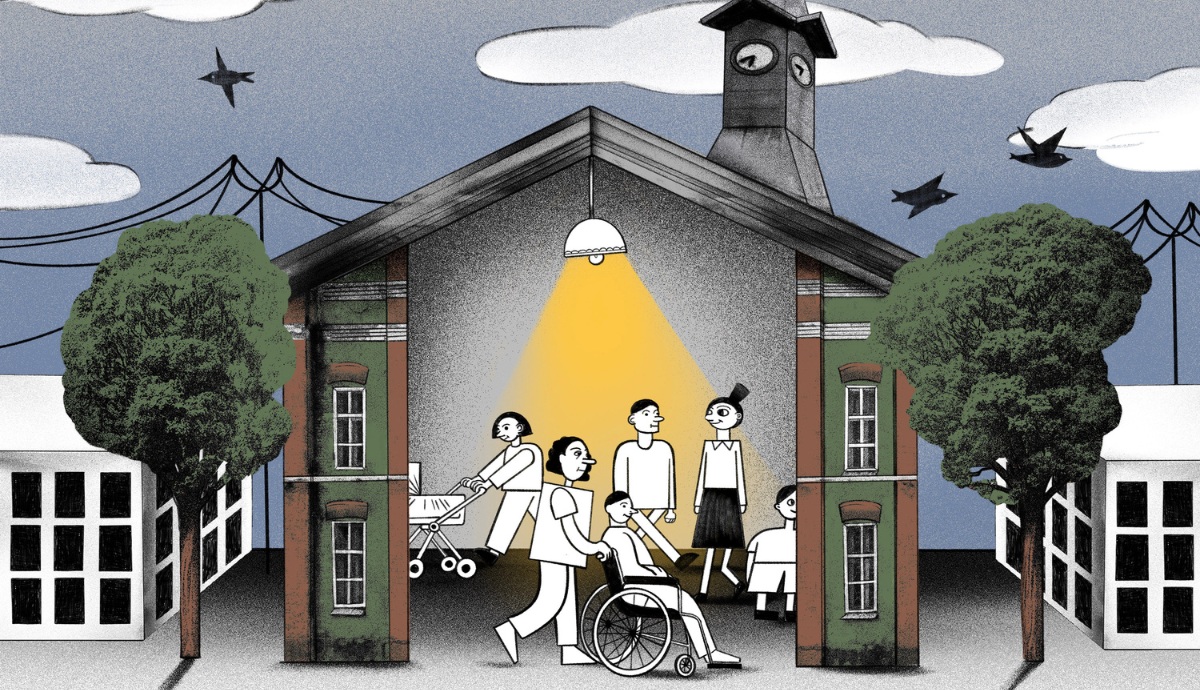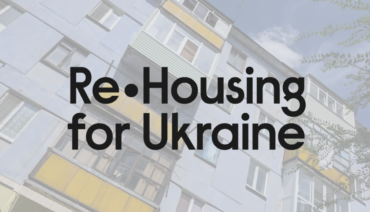
Introduction
“And what is housing? Housing is the foundation of everything.”
Man, IDP, lives in a shelter
Housing is one of the key components of a person’s well-being. Home is a place of rest and social reproduction. At the same time, the issue of housing is complex, it cannot be considered separately from other aspects of social and economic life. The availability and location of housing can affect access to employment, social protection, or quality leisure. In addition, home has deep symbolic meaning, and the type of housing can become part of a person’s identity or way of life. Despite the significant social importance of housing, real estate is also a profitable investment. According to researchers Madden and Marcuse, it is precisely the conflict between housing as home and real estate as a tool for generating profit that is the source of the permanent housing crisis in the modern world.
The full-scale Russian war against Ukraine has led to significant destruction in the housing sector and forced millions of people to leave their homes. As of December 2024, the number of internally displaced people reached 4.6 million. As a consequence of the war, housing needs have increased and become more diverse. In addition, the war has exposed the internal lack of resilience in the housing sector and the lack of effective mechanisms to respond to new challenges.
Today, Ukraine stands on the threshold of changes in housing policy. In 2024, a draft Law “On the Fundamental Principles of Housing Policy” was developed. As of early 2025, work is ongoing on the updated Law “On Social Housing.” In addition, the development of the social housing sector is being actively discussed, namely housing for long-term rent at prices below market rates; such housing will be managed by separate providers or operators of affordable housing. The Government of Ukraine is negotiating the launch of a pilot social housing project with the support of the European Investment Bank.
Previous attempts to develop the non-commercial housing sector in Ukraine were not successful. Since the mid-2000s, Ukraine has had social and temporary housing funds. Earlier, we already wrote about the contradictions and limitations of the existing system. Responsibility for adding to the social and temporary housing stocks lay with local authorities. Despite this, there were no clear financial and management tools that would allow communities to effectively increase and develop these housing stocks.
As of February 2025, one of the models actively discussed by international organizations is the creation of social housing providers owned by communities in the form of municipal enterprises, which would provide housing to designated categories of the population for affordable rent. To ensure that such housing and the provider companies do not operate at a loss, researchers propose using a cost-based rent setting approach. This approach is already successfully used in social housing systems in Austria, Finland, or Denmark. Such a mechanism allows providers to cover operational costs and maintain housing in proper condition.
Currently, there is no up-to-date National Housing Strategy in Ukraine that would describe a comprehensive vision of housing policy. The new version of the Law “On Social Housing” is at the development stage. Despite this, international financial, charitable, and non-governmental organizations are researching the capacity of local government bodies to create and manage social housing. That is why, commissioned by the Czech humanitarian organization People in Need, we have begun researching the housing needs and capacities of the Kalush Hromada in the Ivano-Frankivsk Region.
The report consists of three thematic parts. First, we present secondary data related to the structure of the housing stock in Kalush, housing costs, the number of people on “apartment queues,” as well as the number of internally displaced people, people with disabilities, and participants of military actions residing in Kalush. Next, we focus on housing trends and the needs of various social groups in the city. Finally, we analyze certain aspects of the capacity of local authorities in Kalush to manage future social housing.
Methodology
The goal of the research was to assess the housing problems and needs of different population groups in the Kalush Hromada, as well as certain aspects of the Kalush Hromada’s capacity to develop social housing.
The main objectives of the research:
- to assess the housing problems and needs among different population groups of the Kalush Hromada;
- to assess the affordable housing options offered in the Kalush Hromada and identify gaps or areas in need of improvement;
- to assess certain aspects of the Kalush Hromada’s capacity to own, develop, and manage social housing.
This study is exploratory, as it was aimed at gaining a deeper understanding of the housing situation in the Kalush Hromada. To implement it, we applied a qualitative strategy of data collection and analysis, which involved the use of methods such as expert interviews and focus group discussions. In addition, we sent requests to local government bodies for access to public information in order to obtain statistical data on the composition of the population and housing in the hromada.
The field stage of the research took place from October 2024 to February 2025. In total, 11 expert interviews were conducted within the study with representatives of local government bodies and two non-governmental organizations, as well as 5 focus group discussions with different groups of the local population: military personnel and their relatives, youth, internally displaced people living in dormitories or shelters and those living in rented apartments, people with disabilities. Of these, 3 expert interviews and 3 focus group discussions were conducted online, and the rest (7 interviews and 2 focus group discussions) were held in person in the city of Kalush.
When inviting participants to interviews or discussions, we informed them about the purpose and objectives of the research, the use of its findings, data protection, topics and questions that would be raised. In addition, we provided repeated information at the beginning of each expert interview and focus group discussion. To ensure confidentiality during the research, the data for analysis was accessible only to the research team. Interview recordings were destroyed immediately after processing the information, and all personal data that could identify the participants was removed from the transcripts.
To assess housing problems and needs among different population groups, focus group discussions were conducted. To assess the available affordable housing options in the Kalush Hromada and identify gaps or areas in need of improvement, expert interviews were conducted. Based on the responses of representatives of local government bodies, we also analyzed the community’s capacity to own, develop, and manage social housing. During the expert interviews, we asked them questions about their own preparedness, the difficulties they face and expect to face in case of expanding the social housing stock in the community, as well as the needs for organizing its management. No additional analysis using other methods was conducted to assess the community’s capacity.
The study has a number of limitations:
- It is not representative of specific groups of the local population or of the local population of the Kalush Hromada as a whole: the aim of the research was to describe different experiences regarding housing conditions, renting housing, and living in rented housing, shelters, dormitories, primarily among internally displaced people, military personnel and their relatives and loved ones, youth, and people with disabilities, but these do not necessarily reflect the experiences of all members of the listed groups.
- Participants of the focus group discussions mostly reside in the city of Kalush, therefore the experience of residents of villages and smaller towns is less represented in the study. However, the conclusions drawn from the findings of the expert interviews (with representatives of local government bodies and non-governmental organizations) are relevant to the entire Kalush Hromada;
- Difficulties in conducting the field stage online and by phone: the format of conducting focus group discussions was limited, as not all informants had the access or skills to use online platforms such as Zoom.
- Recruitment of informants was also somewhat complicated, particularly due to limited access to contacts of representatives of certain groups, the small number of representatives of some groups, and their limited ability to be interviewed due to the specifics of employment (military personnel).
Some conclusions regarding trends and problems in the housing sector were first published and developed in previous publications by Cedos. For instance, in this report we refer to the findings of the 2019 study Public Housing Policy in Ukraine: Current State and Prospects for Reform; the 2022 study Social, Temporary and Crisis Housing: What Ukraine Had When It Faced the Full-Scale War; the 2023 policy brief Housing and War: Housing Policy in the First Year of the Full-Scale War; and the findings of the 2022 and 2024 surveys on housing and living conditions in Ukraine.
Conclusions
The housing crisis, exacerbated by the war, and its consequences, particularly the growing demand for housing and the increasing unaffordability of housing, are relevant problems for the housing sector in the Kalush Hromada. Since the start of the full-scale invasion, the number of internally displaced persons in the hromada has increased. In addition, the Kalush Hromada has become a relocation site for a significant number of enterprises, which has further intensified the need for housing.
The private rental sector in the Kalush Hromada has several key problems, which are also characteristic of the private rental sector in Ukraine in general. First and foremost is rental insecurity. Most research participants who rent or have ever rented housing mentioned that they did not have rental contracts. At the same time, even having a rental contract did not always protect tenants from abuses by landlords. In addition, there is an imbalance between rental prices and housing quality. Respondents mentioned dampness, mold, lack of centralized heating, the overall unsatisfactory condition of buildings and apartments, the lack of quality renovations in housing offered for rent. This is also confirmed by data from the Kalush Hromada Development Strategy, which states that as of 2021, most buildings in the community were 45–50% depreciated.
Finally, research participants highlighted the imbalance between wages and rent costs as one of the critical housing issues. Both internally displaced persons and young people noted this. The information corresponds to the general trend of increasing housing unaffordability in Ukraine, which has been observed since the beginning of the full-scale war. As mentioned earlier, according to a Cedos survey, about 42% of people spend more than one-third of their monthly income on housing (rent and utilities). Notably, the share of housing expenses is higher among low-income households.
The financial unaffordability of rental housing is a problem noted by representatives of all groups who took part in the study. For internally displaced people, the housing issue is also closely linked to the issue of employment. The situation is further complicated by the fact that, on the one hand, salaries may be insufficient to cover rent and other expenses, and on the other hand, employment may result in the loss of state-provided living assistance for IDPs. Young people sometimes resorted to negative coping strategies to deal with the financial unaffordability of housing — for example, choosing lower-quality housing or agreeing to poorer renting conditions in order to save money.
Under the conditions of insecurity and unaffordability of private renting, study participants were generally favorable, albeit somewhat cautious, toward the idea of social housing offered through discounted long-term rent. One of the reasons for distrust in the idea of social housing is the lack of information about the concept of social housing itself, as well as the absence of successful examples of social housing implementation in Ukraine. The main issues regarding social housing which concerned the informants were its potential cost and affordability, the quality of such housing, and long-term residency guarantees.
Both among internally displaced people and among the youth who participated in the study, a general distrust toward state housing programs could be observed. This was especially evident among young people, who voiced the narrative that in matters of housing, particularly purchasing housing, one should rely only on oneself. According to young informants, purchasing a home is the most desirable and acceptable option for them. At the same time, they acknowledge that such a scenario requires significant effort, time, and help from relatives. Nonetheless, a considerable share of focus group participants recognized that social housing could serve as an alternative to expensive and unregulated private rental housing.
Among the specific problems faced by internally displaced persons in the Kalush Hromada, discrimination while renting housing should be highlighted.
In addition, internally displaced persons living in shelters find themselves in an especially vulnerable situation. One of the housing pathways mentioned by study participants was the move from kindergartens, where some evacuated internally displaced people initially stayed, to shelters where they still reside today. Thus, shelters are becoming spaces of “permanent temporariness” and uncertainty, as well as places where various types of vulnerabilities intersect and deepen. According to study participants living in shelters, only a small number of their neighbors were able to move from shelters to other housing. This indicates the complexity of the transition from temporary to permanent housing and the lack of available affordable housing options, particularly for vulnerable population groups.
Housing needs of military personnel, veterans, and their families are particularly urgent in the Kalush Hromada. First and foremost, there is a need for affordable and adequate housing, as well as housing adapted to the needs of veterans with disabilities. Additionally, there is a need for housing for the families of military service members undergoing long-term treatment or rehabilitation in Kalush.
At present, the Kalush community does not have housing that could serve as an adequate alternative to the commercial sector of purchasing or renting housing. As of 2024, the community had 3 apartments in the social housing stock and 3 shelters for internally displaced people. Despite the growing demand for housing since 2022, representatives of local government bodies estimate that the hromada has around 2,000 vacant apartments. Their owners have either left the city or live in a different home but do not offer these vacant apartments for rent or sale.
The hromada does not have extensive experience in housing management. The existing experience can be described as ad hoc or reactive. Nevertheless, the hromada has municipally-owned buildings that could be converted into social housing. A key obstacle to the creation of social housing is the lack of a legislative framework that would define social housing and outline the rules for managing this kind of housing. Despite this, non-governmental organizations noted the hromada’s openness and flexibility in cooperation on housing projects.There is a need to strengthen the capacity of the Kalush Hromada to develop, own, and manage social housing. In particular, there is a need to increase awareness of social housing — for example, regarding different approaches to managing such housing, regarding the work of social housing providers, rent setting mechanisms, and the involvement of residents in housing management. One way to address this need could be through experience exchange, establishing contacts, and building partnerships with representatives of housing companies that are providers of social and affordable housing in other countries.
Support Cedos
During the war in Ukraine, we collect and analyse data on its impact on Ukrainian society, especially housing, education, social protection, and migration















